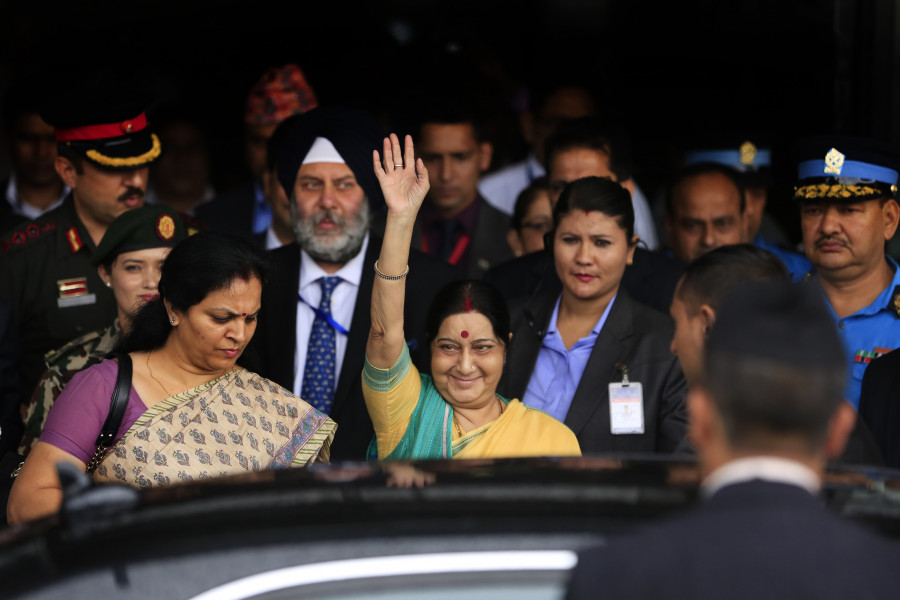Sushma Swaraj oversaw great highs, and equally great lows, in Nepal-India relations

When Sushma Swaraj visited Kathmandu in February last year, she and Prime Minister KP Sharma Oli spoke informally for at least half an hour about their health. Swaraj and Oli had both undergone kidney transplants and Swaraj advised Oli on behavioural patterns and a proper diet.
“I fondly recall how intimately she used to call me brother and share feelings of affinity,” Oli tweeted on Wednesday.
This personal approach to diplomacy was characteristic of Swaraj, who died on Tuesdaynight of a heart attack. Swaraj, the former external affairs minister, was known for her geniality and good nature as much as her oratory. She employed that affability on Oli, and the two ended up sharing a personal bond, said Oli’s confidantes. Swaraj’s visit was part of Narendra Modi’s charm offensive, an attempt to woo Oli back from the nationalist, anti-Indian, pro-Chinese bent he had adopted since the 2015 Indian blockade.
Under Swaraj’s tenure as external affairs minister, Nepal-India ties went from great highs to great lows. In November 2014, with Swaraj in office, Modi visited Nepal to much fanfare, the first sitting prime minister to do so in 17 years. Modi’s speech at the Constituent Assembly, which then doubled as Parliament, quickly won over Nepalis. While Modi received a hero’s welcome, Swaraj left her own mark, as a quiet but resourceful minister who implemented her government’s ‘neighbourhood first’ policy.
But a year later, with Swaraj still in office, India imposed a blockade on a Nepal ravaged by the earthquake. Madhesis in particular were unhappy with Nepal’s newly promulgated constitution, and so was India. Then minister for foreign affairs Kamal Thapa called on Swaraj and assured her that the government in Kathmandu was ready to address grievances, even sharing a seven-point roadmap formulated by the government. But that too garnered great controversy in Nepal, as a sitting minister had shared a Cabinet decision with the Indian foreign minister without informing the Nepali people. Ultimately, the blockade continued for months.
But Nepali ambassadors and foreign policy analysts say Swaraj was not to blame for the blockade.
“The perception that exists about Swaraj is not true,” said Deep Kumar Upadhyay, former Nepali ambassador to India who was in New Delhi during the blockade. “She was very unhappy and deeply hurt by the blockade and had an entirely different view from that of the bureaucrats.”
Thapa too recalled Swaraj as being sympathetic to Nepal.
“She made important contributions to strengthening ties between Nepal and India,” said Thapa, who also recalled that she addressed him as ‘brother.’
Even though Modi was prime minister, some sections of Nepalis saw Swaraj, along with then foreign secretary and current External Affairs Minister S Jaishankar, as having been behind the blockade.
With the blockade, many believe that the then CPN-UML reaped most political benefits, giving Oli a leeway to pursue transit and transportation facilities with China in a bid to end Nepal’s long-standing dependency on India.
Prakash Sharan Mahat, who became the foreign minister after India lifted the blockade, said that the blockade cannot solely be blamed on one particular person.
“What role Sushma played in imposing the blockade is a matter of further study,” said Mahat. “Sometimes, decisions are taken beyond the suggestions of a foreign minister.”
Swaraj, during a speech at the Indian Rajya Sabha, even said that this was not the first time that a blockade had been imposed on Nepal, referring to the economic blockade of the 90s. This statement of hers was criticised even within India.
“A blockade was not our intent,” Upadhyay recalled Swaraj as having told him. “I do not know how this situation arrived, but I am very, very sad.”
By Anil Giri